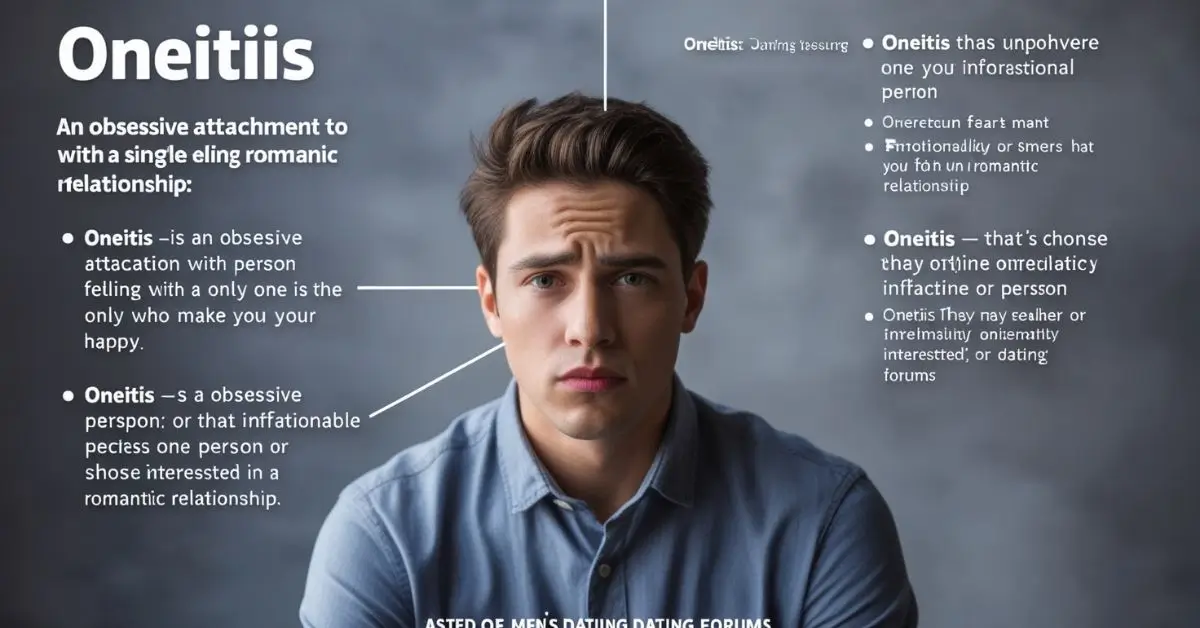Human relationships are complex and dynamic, constantly evolving based on mutual understanding, experiences, and emotional connections. While love and affection are essential for fostering strong bonds, they can sometimes manifest in unhealthy or obsessive ways. One of the more recognizable forms of romantic obsession is what has become known as “Oneitis.” Though this term may sound foreign to many, its implications are widely familiar—intense infatuation with a single person, often accompanied by irrational thoughts and emotional turmoil. In this article, we will explore what Oneitis is, how it develops, its potential effects on both mental and emotional health, and effective coping strategies for overcoming it.
What is Oneitis?
Oneitis is a colloquial term that describes an obsessive attachment to or infatuation with a single person, typically someone who is unattainable or uninterested in a romantic relationship. The term gained popularity within certain online communities, particularly among men’s dating forums, but its underlying concept applies universally across genders. It is characterized by an intense and often irrational belief that one particular person is the only one who can make you happy or that they are your “soulmate.”
The word “Oneitis” is a blend of “one” and the suffix “-itis,” which commonly refers to inflammation or disease (e.g., arthritis, bronchitis). In this context, Oneitis suggests a pathological condition of romantic fixation, likening it to a sickness of the heart or mind. Those suffering from Oneitis may experience emotional symptoms similar to those of anxiety, depression, or obsession, resulting in self-destructive behaviors or an overwhelming fear of rejection.
While it is natural for people to experience strong feelings of affection and admiration towards someone they are attracted to, Oneitis takes these feelings to an unhealthy extreme. It occurs when an individual becomes so emotionally fixated on one person that they fail to recognize the possibility of connecting with others or finding happiness outside of the relationship. As a result, those with Oneitis often place their emotional well-being in the hands of someone else, leading to feelings of desperation, inadequacy, and frustration.
The Development of Oneitis
Oneitis typically develops when an individual places an idealized perception on another person. This idealization may arise from personal fantasies, unfulfilled desires, or even misinterpretations of shared experiences. People suffering from Oneitis often view their object of affection as perfect, disregarding their flaws or rationalizing behaviors that would normally be seen as red flags. The fixation is fueled by a persistent hope that, against all odds, the other person will reciprocate their feelings, leading to a fulfilling relationship.
Several factors contribute to the development of Oneitis, including:
1. Scarcity Mentality
One of the primary drivers of Oneitis is the belief that “there is only one.” This scarcity mentality convinces individuals that their current object of affection is their only shot at love or happiness, leading them to cling to the relationship with desperation. The fear of missing out on a unique and irreplaceable opportunity can become all-consuming, preventing them from seeing the potential for other relationships.
2. Unmet Emotional Needs
For some people, the fixation on one person can be rooted in deeper emotional needs. These may include feelings of loneliness, low self-worth, or a desire for validation. In many cases, individuals with Oneitis may believe that having a relationship with their person of interest will fill a void in their life. This mindset places undue pressure on the relationship, creating an unhealthy dependency on the outcome.
3. Romanticized Beliefs
Cultural narratives and media often promote the idea of soulmates, “the one,” or love at first sight. Movies, songs, and literature frequently reinforce the notion that a perfect romantic partner exists for everyone, waiting to sweep them off their feet. While these ideas can be charming and entertaining, they can also foster unrealistic expectations about relationships. People who are strongly influenced by these romanticized beliefs may fall into the trap of Oneitis, mistakenly assuming that finding “the one” is the key to lifelong happiness.
4. Lack of Experience
In some cases, Oneitis may develop because an individual lacks experience in dating or relationships. When someone is inexperienced or has had limited romantic interactions, they may place excessive emotional value on the few connections they do have. This can lead to overinvestment in one person, as they may not have a broader perspective on the availability of romantic partners or how relationships naturally evolve.
The Consequences of Oneitis
The emotional intensity of Oneitis can lead to a range of negative consequences, both for the person experiencing the obsession and for the object of their affection. Some of the most common outcomes include:
1. Emotional Turmoil
Oneitis often leads to intense feelings of anxiety, sadness, and frustration. The fixation on a single person creates a state of emotional dependence, where the individual’s happiness and self-worth are tied to the outcome of the relationship. When the object of affection does not reciprocate their feelings, the individual may experience deep emotional pain and self-doubt.
2. Unrealistic Expectations
When someone is afflicted with Oneitis, they tend to place the object of their affection on a pedestal, viewing them as perfect or infallible. This distorted perception can lead to unrealistic expectations about the relationship and the other person’s behavior. Over time, these expectations may lead to disappointment, resentment, or feelings of betrayal when the reality of the situation fails to match their idealized vision.
3. Social Isolation
As a person becomes more consumed by their obsession with one individual, they may withdraw from other social interactions or neglect their relationships with friends and family. This isolation can exacerbate feelings of loneliness and reinforce the belief that the object of their affection is the only person who can bring them happiness. Over time, this narrowing of focus can create a feedback loop, where the person becomes increasingly isolated and more dependent on the unattainable relationship.
4. Decreased Self-Worth
Individuals suffering from Oneitis often place their sense of self-worth in the hands of the person they are fixated on. When their feelings are not reciprocated, they may internalize this rejection as a reflection of their own inadequacy. This can lead to a decrease in self-esteem, as they come to believe that they are not “good enough” to be loved or that they lack the qualities needed to form a meaningful relationship.
5. Missed Opportunities
By fixating on one person, individuals with Oneitis may miss out on other potential romantic or social opportunities. Their narrow focus prevents them from exploring new connections, meeting new people, or developing meaningful relationships with others. As a result, they may limit their own personal growth and fulfillment by clinging to an unattainable fantasy.
Coping with Oneitis
Overcoming Oneitis requires self-awareness, emotional resilience, and a willingness to let go of unrealistic expectations. While it can be challenging to break free from this form of romantic obsession, several strategies can help individuals regain control over their emotions and move toward healthier relationship dynamics.
1. Shift Your Mindset
One of the most important steps in overcoming Oneitis is to recognize and challenge the scarcity mentality that fuels it. Instead of believing that there is only one person who can make you happy, acknowledge that there are countless potential partners out there who may be a better fit for you. By broadening your perspective and recognizing that love and connection can come from many sources, you can reduce the intensity of your fixation on one person.
2. Focus on Self-Improvement
Investing in your own personal growth and well-being can help shift your focus away from the object of your obsession and back onto yourself. By pursuing hobbies, developing new skills, or engaging in activities that boost your self-esteem, you can build a stronger sense of self-worth that is not dependent on external validation. This increased confidence can make you less likely to become fixated on one person and more open to exploring new relationships.
3. Practice Mindfulness
Mindfulness techniques, such as meditation and deep breathing exercises, can help you manage the emotional intensity of Oneitis. By becoming more aware of your thoughts and feelings in the present moment, you can gain greater control over how you respond to them. This can prevent you from becoming overwhelmed by anxiety, jealousy, or despair, and allow you to approach your emotions with greater clarity and calm.
4. Seek Support from Friends and Loved Ones
Talking to friends, family, or a therapist about your feelings can provide valuable perspective and emotional support. Others may be able to help you see the situation more objectively and offer guidance on how to move forward. Surrounding yourself with a supportive network can also help combat the social isolation that often accompanies Oneitis.
5. Set Healthy Boundaries
If the object of your affection is someone you interact with regularly, such as a coworker, friend, or acquaintance, it may be necessary to set healthy boundaries to protect your emotional well-being. This could involve limiting your contact with them, avoiding situations where you are likely to feel rejected or overwhelmed, or focusing on developing other relationships in your life.
Conclusion
Oneitis is a form of romantic obsession that can lead to emotional distress, social isolation, and a diminished sense of self-worth. While it is natural to feel strong emotions for someone you care about, Oneitis takes these feelings to an unhealthy extreme, preventing individuals from recognizing their own value and exploring other potential relationships. By shifting their mindset, focusing on self-improvement, and seeking support, those affected by Oneitis can learn to overcome their fixation and cultivate healthier, more balanced relationships. Ultimately, love should enhance one’s life, not become a source of pain or emotional dependency.











